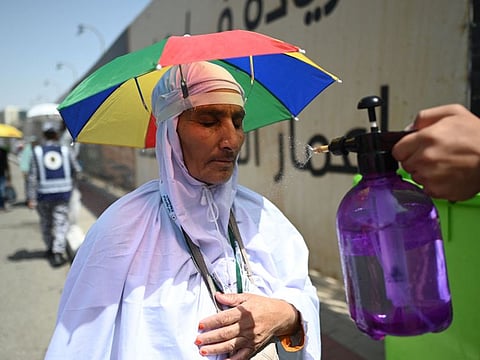Saudi Arabia to provide 1 million cubic metres of water a day during Hajj
Readiness comes after completion of 18 infrastructure projects in Mecca and the holy sites

Dubai: As millions of pilgrims prepare to perform Hajj in the Islamic year 1446, Saudi Arabia’s national water system has announced the completion of its operational readiness plan, setting the stage for a massive logistical undertaking that will see up to one million cubic metres of water supplied daily during peak days of the pilgrimage.
The initiative, overseen by the Ministry of Environment, Water and Agriculture, aims to ensure uninterrupted, high-efficiency water supply to Mecca, the holy sites of Mina, Arafat, and Muzdalifah, and the Grand Mosque, during one of the most logistically challenging events in the world.
Daily water pumping is expected to average 750,000 cubic metres, rising to over one million cubic metres on Arafat Day and during Eid, the spiritual high point of the pilgrimage. The plan aligns with the highest standards of operational reliability and environmental safety, and has been coordinated across all agencies involved in Hajj logistics.
The readiness comes after months of preparatory work, including the completion of 18 major water infrastructure projects in Mecca and the holy sites. These projects included the expansion of water distribution networks, strategic storage enhancements, upgraded pumping stations, and advanced wastewater treatment plants.
The Saudi Water Authority has conducted extensive inspections and technical readiness checks to ensure alignment with the national water strategy, covering the full cycle from production and transport to storage, distribution, and treatment.
With a daily desalinated water transport capacity exceeding 1.2 million cubic metres, and a transport network stretching over 1,300 kilometres, the system is positioned to meet peak demand. Pumping station efficiency now exceeds 125 per cent, while over 32,000 public restrooms across the holy sites have been inspected and prepared for use.
In addition to ensuring quantity, Saudi Arabia is also focusing on water quality. Treatment plants have a combined capacity of 750,000 cubic meters per day, operating under strict environmental and public health protocols. More than 4,000 laboratory tests will be conducted daily using the latest technologies to monitor water safety and cleanliness.
The Saudi Water Authority has also stepped up its field inspections, logging more than 2,000 hours of on-site supervision in recent weeks across Mina, Arafat, and Muzdalifah.
More than 2,000 Saudi engineers and technicians are involved in managing the water infrastructure during the Hajj season, representing multiple entities including the National Water Company, Water Transmission and Technologies Company, the Saudi Water Partnerships Company, and the Saline Water Conversion Corporation.
Huda Ata is an independent writer based in the UAE
Sign up for the Daily Briefing
Get the latest news and updates straight to your inbox



